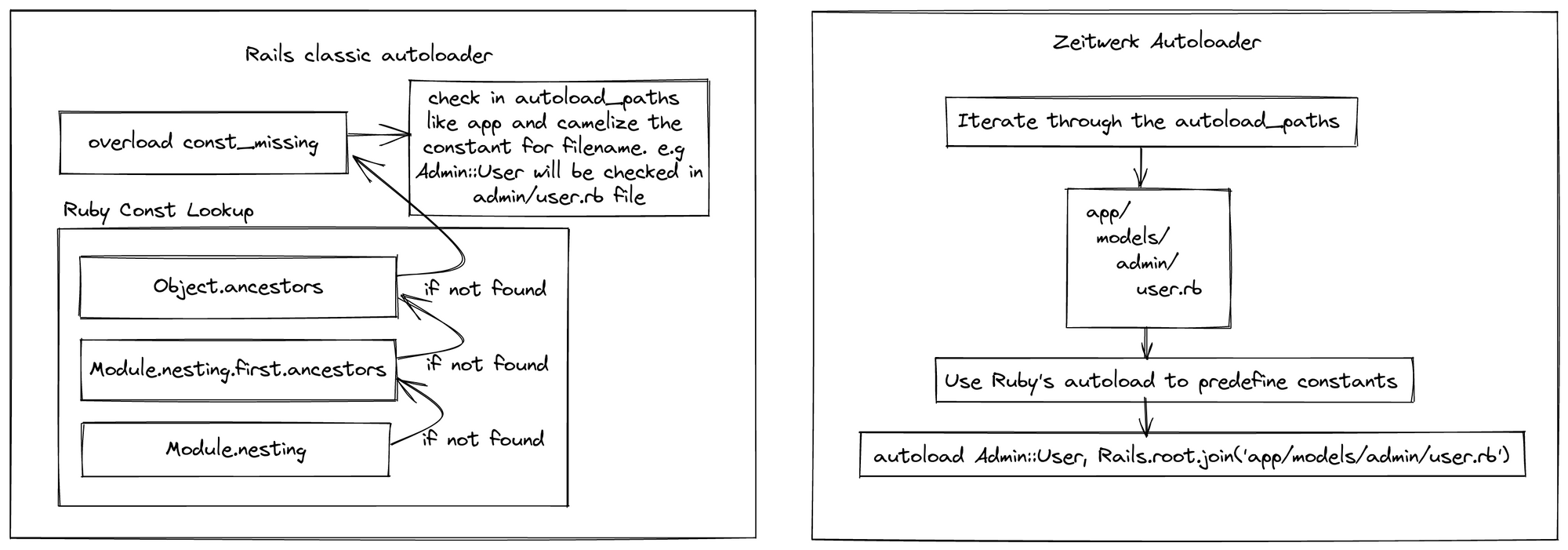Rails Rails7 的 Zeitwerk 模式解惑
原文请参看我的博客:https://xfyuan.github.io/2022/11/rails7-zeitwerk-mode/
=================================================================
本文已获得原作者(Athira Kadampatta、Supriya Laxman Medankar)和 Kiprosh 授权许可进行翻译。原文详细讲述了 Rails 7 中新的 Zeitwerk 自动加载模式。
- 原文链接:Autoloading pitfalls fixed by Rails 7’s default Zeitwerk mode
- 作者:Athira Kadampatta、Supriya Laxman Medankar
- 站点:Kiprosh,一家印度的软件开发公司。
【正文如下】
Rails 中传统的 autoloader 很有帮助,但仍然有一些瑕疵造成自动加载偶尔会出毛病。为了解决这个问题, Xavier Noria 在 Rails 6 的这个 PR 中提出了 zeitwerk 模式并使其可配置使用。Rails 7 则更进一步,zeitwerk 完全替代了传统的 autoloader。
本文中,我们会看看传统的自动加载会碰到的问题,以及 Zeitwerk 模式如何解决的。(你可以阅读这篇文章 来理解 Rails 的 autoloader 是怎样工作的)。
How classic autoloading works?
起初,Rails 使用的是在 Active Support 中称作 Classic Autoloading 的实现来作为 autoloader,一直持续到 Rails 6。
Classic Autoloading 依赖的是 Ruby 的常量查找。要解析一个常量,会首先在所定义的类的词法域中查找,然后在其祖先链中查找。如果该常量未找到,const_missing方法就会被 Ruby 调用。Rails 覆写了 Ruby 的const_missing 方法,并使用autoload_paths 根据惯例约定来解析常量。
How zeitwerk autoloading works?
新引入的 Zeitwerk Mode 则不依赖 Ruby 的常量查找。
相反,它利用的是 Ruby 的 Module#autoload 方法提前告知 Ruby 哪个文件将定义一个特定常量,而不需要立即加载该文件。

Common Problems resolved by zeitwerk mode
传统模式存在许多问题,但都已被 zeitwerk 模式解决了。这其中,我们会看看三个不同的陷阱,每个都带有示例。
1、When Constants aren't Missed
假设我们有如下 model 结构:
# course.rb
class Course
def initialize
puts "From Course"
end
end
# mit_university/course.rb
module MitUniversity
class Course
def initialize
puts "From MitUniversity::Course"
end
end
end
# mit_university/engineering.rb
module MitUniversity
class Engineering
def initialize
@course = Course.new
end
end
end
With Classic Mode
Loading development environment (Rails 5.2.7.1)
2.7.5 :001 > Course.new
From Course
=> #<Course:0x0000563bfa029810>
2.7.5 :002 > MitUniversity::Engineering.new
From Course
=> #<MitUniversity::Engineering:0x0000563bf9e7ab40 @course=#<Course:0x0000563bf9e7aaf0>>
这里,由于我们在调用MitUniversity::Course之前调用了Course,Ruby 的常量查找就已经在内存中自动加载了Course,所以如果我们想要为MitUniversity::Engineering创建一个对象时,它就会引用到已在内存中被自动加载的Course,而不去搜索MitUniversity::Course了。这让自动加载依赖于常量被调用的顺序。
With Zeitwerk Mode
Loading development environment (Rails 7.0.3)
2.7.5 :001 > Course.new
From Course
=> #<Course:0x00005615a9707fa0>
2.7.5 :002 > MitUniversity::Engineering.new
From MitUniversity::Course
=> #<MitUniversity::Engineering:0x00005615ae41d290 @course=#<MitUniversity::Course:0x00005615ae40b270>>
2.7.5 :003 >
因为 zeitwerk 模式为所有常量定义了autoload_path,它已经知道了到哪里去查找哪个常量。所以尽管首先初始化Course,但在MitUniversity::Engineering类中调用时,它仍然如期望的那样加载了MitUniversity::Course。
2、Autoloading within Singleton Classes
这是一个关于 Singleton 类方法的类似问题,已经被 zeitwerk 模式所解决。例子如下所示:
# mit_university/course.rb
module MitUniversity
class Course
def initialize
puts "From MitUniversity::Course"
end
end
end
# mit_university/engineering.rb
module MitUniversity
class Engineering
class << self
def details
Course.new
end
end
end
end
With classic mode
如果我们在调用MitUniversity::Course之前调用 MitUniversity::Engineering.details,它将会抛出uninitialized constant Course的错误。这是由于,当自动加载被触发时,Rails 只去检查顶层命名空间,因为 singleton 类是匿名的,所以 Rails 不会知道嵌套的MitUniversity。
Loading development environment (Rails 5.2.7.1)
2.7.5 :001 > MitUniversity::Engineering.details
Traceback (most recent call last):
2: from (irb):3
1: from app/models/mit_university/engineering.rb:5:in `details'
NameError (uninitialized constant Course)
2.7.5 :002 > MitUniversity::Course
=> MitUniversity::Course
2.7.5 :003 > MitUniversity::Engineering.details
From MitUniversity::Course
=> #<MitUniversity::Course:0x0000560cabb27c18>
With zeitwerk mode
Zeitwerk 模式则不会抛出任何错误,并且即使之前没有自动加载它也能载入该常量。
Loading development environment (Rails 7.0.3)
2.7.5 :001 > MitUniversity::Engineering.details
From MitUniversity::Course
=> #<MitUniversity::Course:0x0000559ebba13dd0>
3、Autoloading and Single-table Inheritance (STI)
假设我们有如下 Single-table Inheritance (STI) 的 model 已定义:
class Polygon < ApplicationRecord
end
class Triangle < Polygon
end
class Rectangle < Polygon
end
class Square < Rectangle
end
Square继承自 Rectangle,所以当我们调用Rectangle.all时,结果必须包含Polygon类型的Square以及Rectangle。
With classic mode
然而,当我们调用Rectangle.all时,并不能在结果中看到Square记录。我们可以看到所生成的 SQL 查询中并未包含Square。
Loading development environment (Rails 5.2.7.1)
2.7.5 :001 > Rectangle.all
Rectangle Load (0.4ms) SELECT `polygons`.* FROM `polygons` WHERE `polygons`.`type` = 'Rectangle' /* loading for inspect */ LIMIT 11
=> #<ActiveRecord::Relation [#<Rectangle id: 1, area: 100.0, type: "Rectangle", type_id: nil, created_at: "2022-08-28 14:00:50.705523000 +0000", updated_at: "2022-08-28 14:00:50.705523000 +0000">, #<Rectangle id: 2, area: 200.0, type: "Rectangle", type_id: nil, created_at: "2022-08-28 14:01:09.543825000 +0000", updated_at: "2022-08-28 14:01:09.543825000 +0000">]>
2.7.5 :002 > Square
=> Square(id: integer, area: float, type: string, type_id: integer, created_at: datetime, updated_at: datetime)
2.7.5 :003 > Rectangle.all
Rectangle Load (0.9ms) SELECT `polygons`.* FROM `polygons` WHERE `polygons`.`type` IN ('Rectangle', 'Square') /* loading for inspect */ LIMIT 11
=> #<ActiveRecord::Relation [#<Rectangle id: 1, area: 100.0, type: "Rectangle", type_id: nil, created_at: "2022-08-28 14:00:50.705523000 +0000", updated_at: "2022-08-28 14:00:50.705523000 +0000">, #<Rectangle id: 2, area: 200.0, type: "Rectangle", type_id: nil, created_at: "2022-08-28 14:01:09.543825000 +0000", updated_at: "2022-08-28 14:01:09.543825000 +0000">, #<Square id: 5, area: 250.0, type: "Square", type_id: nil, created_at: "2022-08-28 14:01:52.165141000 +0000", updated_at: "2022-08-28 14:01:52.165141000 +0000">]>
要解决这个问题,我们不得不在rectangle.rb文件底部加上require_dependency 'square':
# app/models/rectangle.rb
class Rectangle < Polygon
end
require_dependency 'square'
With zeitwerk mode
由于在 zeitwerk 模式中,Square已被自动加载进来,我们就无需添加require_dependency 'square'这一行了:
Loading development environment (Rails 7.0.3)
2.7.5 :001 > Rectangle.all
Rectangle Load (0.9ms) SELECT `polygons`.* FROM `polygons` WHERE `polygons`.`type` IN ('Rectangle', 'Square') /* loading for inspect */ LIMIT 11
=> #<ActiveRecord::Relation [#<Rectangle id: 1, area: 100.0, type: "Rectangle", type_id: nil, created_at: "2022-08-28 14:00:50.705523000 +0000", updated_at: "2022-08-28 14:00:50.705523000 +0000">, #<Rectangle id: 2, area: 200.0, type: "Rectangle", type_id: nil, created_at: "2022-08-28 14:01:09.543825000 +0000", updated_at: "2022-08-28 14:01:09.543825000 +0000">, #<Square id: 5, area: 250.0, type: "Square", type_id: nil, created_at: "2022-08-28 14:01:52.165141000 +0000", updated_at: "2022-08-28 14:01:52.165141000 +0000">]>
Conclusion
对于 Rails 7,Zeitwerk 已经成为默认模式,而传统模式已不可用了。这是一个很有影响的变化,改进了 Rails 中常量自动加载的方式,解决了诸多如上所述的传统模式带来的问题。